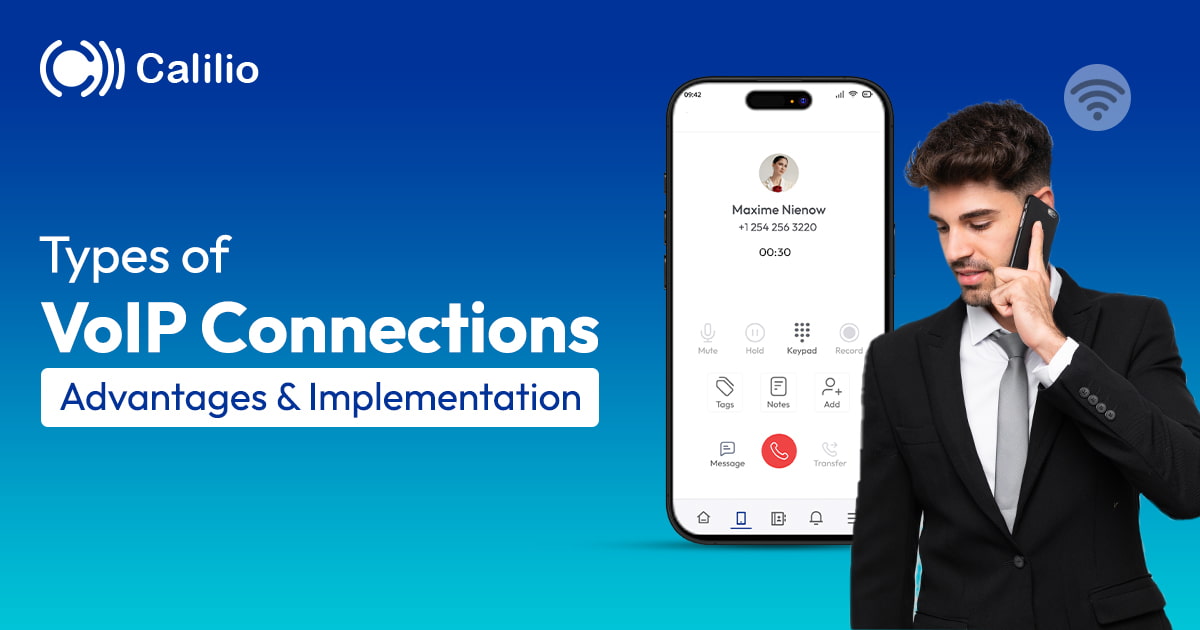Types of VoIP Connections: Advantages & Implementation

VoIP (Voice over Internet Protocol) has revolutionized how businesses communicate seamlessly with individuals worldwide, including their team members and clients. VoIP phone systems transmit voice communications over the internet through data packets and offer an alternative to traditional phone lines.
VoIP connections enable voice calls, texting, video conferencing, and real-time chat. Switching to VoIP allows businesses to enjoy HD call quality, access advanced call management features, and help them save up to 60% on communication costs.
VoIP offers cost-effective and versatile business communication solutions. There are various VoIP phone connections, and understanding the different types of VoIP connections is crucial for businesses to select the most suitable one.
What is a VoIP Connection?
A VoIP connection is the method businesses use to establish smooth virtual business communications between stakeholders, team members, and clients/customers. With a VoIP phone connection, geographical boundaries disappear as one can connect with anyone, anywhere, at any time, as long as they have a reliable internet connection.
Advantages of VoIP Phone Connection
VoIP phone connections enable businesses and individuals to make voice calls, send messages, conduct video conferences, and engage in real-time communication using cloud-based technology. They offer a range of advantages to enhance business productivity. Below are listed the major advantages of VoIP connections.

1. Cost Effectiveness
Considering VoIP phone connection for your business communication saves you from the expensive installation and maintenance costs you would have to pay to set up traditional landlines. VoIP requires minimal hardware, reducing both installation and maintenance costs. Moreover, when you connect VoIP to your business phone system, you can make long-distance and international calls at a fraction of the cost of traditional phone calls.
2. Increased Mobility and Flexibility
Voice over IP connection offers the freedom to use your phone system anywhere you have an internet connection. It allows you to stay connected no matter where you are. VoIP, being a cloud phone system, integrates with many other tools and applications, such as email, web browsers, and social networking sites, further enhancing its flexibility.
3. Better Communication Features
VoIP connection offers advanced call management features like call routing, automated attendants, and call queues, helping your business operate more efficiently. Moreover, the VoIP system includes built-in collaboration tools such as video conferencing and screen sharing, improving team collaboration.
Four Types of VoIP Connections
There are typically four types of VoIP connections: Mobile Softphones and Apps, Computer-to-Phone Connections, Computer-to-Computer Connections, and Analog Telephone Adapters for Landlines. Understanding these VoIP connection types help you choose the best one to enhance productive business communications.

1. Mobile Softphones and Apps
VoIP connections enable users to access advanced communication features through mobile devices and softphones, eliminating the need for additional hardware like desk phones or IP phones. It allows for complete location independence, as users can make calls, send SMS messages, and initiate video conferences from any smartphone with an internet connection. Mobile softphones and apps utilize the internet connection to transmit voice calls, enabling communication with both VoIP users and traditional phone users.
2. Computer-to-Phone Connections
A computer-to-phone connection in VoIP enables you to make voice calls from your computer to various phone devices, including IP phones, traditional analog phones, and cell phones. It utilizes a VoIP service provider to connect the Internet and the traditional phone network, expanding your reach.
3. Computer-to-Computer Connections
A computer-to-computer VoIP phone connection is a straightforward method of establishing voice calls between separate computers. It allows you to make and receive voice calls, send texts and voicemails, and participate in video conferences. This type of VoIP communication uses a web-based service or a downloadable softphone VoIP application.
4. Analog Telephone Adapter for Landlines
A landline VoIP connection allows users to connect traditional landline phones to the internet and use VoIP phone services. An Analog Telephone Adapter (ATA) is used to convert the voice signals from the landline phone into digital signals compatible. This VoIP phone connection is ideal for individuals who prefer the familiarity of traditional telephony and wish to continue using their landline phone.
Conclusion
VoIP connections offer businesses a flexible and cost-effective solution for voice communication. Implementing the right VoIP provider streamlines communication infrastructure enhances productivity, and propels businesses toward success in a dynamic business landscape.
Calilio is a one-stop solution for business communication. Being one of the most renowned VoIP solutions, we have served thousands of companies with our VoIP phone services. Connect with us now to get started with the best VoIP services.
Summarize this blog with:
Frequently Asked Questions
Does VoIP work without the internet?
VoIP requires a reliable internet connection to transmit voice calls, text messages, and voicemails. Since VoIP converts voice signals into data packets and sends them over the internet, without an internet connection, VoIP won’t work.
Does a VoIP phone need a phone jack?
Why are there two network ports on VoIP phones?
How does VoIP connect to the internet?

Still have questions?
Can’t find the answer you’re looking for? Please chat with our friendly team.
Stay in the loop
Get the latest call insights, trends, and updates delivered straight to your inbox.
By subscribing, you agree to receive updates from Calilio.
You can unsubscribe anytime.
